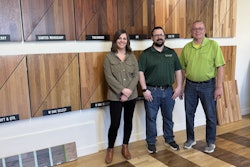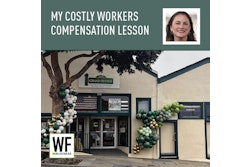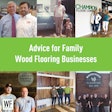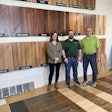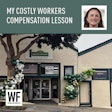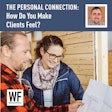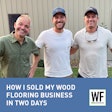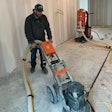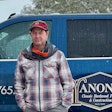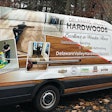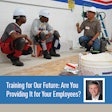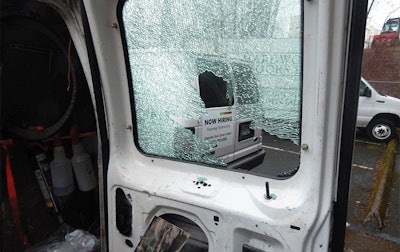
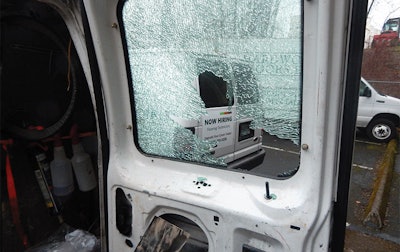
 (Top photo, and above) Doug Lux awoke to find four of his vans were smashed in a robbery.
(Top photo, and above) Doug Lux awoke to find four of his vans were smashed in a robbery.
It's the kind of thing that keeps wood flooring pros awake at night: walking outside and seeing the work van and the equipment inside it engulfed in flames—or discovering the company's fleet of vans were smashed and looted overnight.
Such incidents can devastate a wood flooring business, but as many pros can attest, having the right insurance plays a huge factor in keeping a business afloat after disaster strikes. WFB spoke with wood floor pros who lived these nightmares to find out what they learned from the experience. We also spoke with insurance expert Janet Ruiz, director, strategic communications for the New York City-based Insurance Information Institute, about some important advice for wood flooring contractors regarding choosing the right insurance and filing claims to make sure your wood flooring business is protected.
When disaster strikes
Doug Lux of D-Lux Hardwood Floors in Portland, Ore., got the call from an employee early in the morning. "He noticed that on four of our vehicles, the back windows were broken into and then the thieves were able to get in and open the doors on two of them," Lux says.
The fleet had been parked outside of Lux's shop. "First thing you think is, well, how much did they take? Are we going to have enough equipment to do the job that day, or what do we need to do to get things back on the road?" Lux says. The next call was to the police, and Lux was told they didn't come out for robberies any longer.
"They just took our information over the phone," he says, "and then they ask you to email or send in your loss, or your estimated losses, that kind of stuff." D-Lux Hardwood employees made sure to take plenty of pictures of the grim scene. "There was glass all over," Lux says. "What a mess."
RELATED: How to Protect Your Wood Floor Vehicle Against a Break-In
 When the fire hit the seats, Abramo realized there was no stopping it. Nearly all of Abramo's tools were destroyed in the fire.
When the fire hit the seats, Abramo realized there was no stopping it. Nearly all of Abramo's tools were destroyed in the fire.
 The fire in Abramo's van burned so hot the steering wheel melted off.
The fire in Abramo's van burned so hot the steering wheel melted off.
On the other side of the country, it was a smell that tipped off Rich Abramo of Mansfield Center, Conn.-based Abramo Hardwood Flooring that something was wrong. He was working inside a residence when the smell of burning led him outside, where he saw flames shooting up from underneath his van's dashboard. After telling the homeowner to call 911, Abramo grabbed a yard hose and ran toward the fire, but the hose wasn't working. When he tried to get closer, the heat burned his forehead, forcing him back. Then the fire hit the van's seats, and he realized there was no stopping it.
"At that point, all I could do was watch them burn," Abramo says.
When the fire trucks arrived on the scene, Abramo called his insurance broker.
Vehicle insurance options 101
When it comes to insuring wood flooring vehicles, contractors need commercial auto insurance, according to Ruiz, who has more than 25 years of experience in the insurance industry.
"Your personal auto is going to have to exclude any business," she says. "You'd be at risk of not getting your claims paid if you didn't have commercial auto insurance." Commercial auto insurance offers several advantages: It covers a fleet of vehicles and insures the different drivers using them.
Commercial auto insurance provides the same basic coverage options as personal, including liability, collision and comprehensive insurance—all three of them separate. While liability covers any damage your vehicle potentially does to others, collision insurance applies when the vehicle runs into something, whether it's another car, a pole, tree, deer, etc. Comprehensive insurance covers uncontrollable incidents such as vehicle theft and fires, two things wood floor vehicles may have a heightened risk of.
"Many vehicles, such as in wood flooring, are tricked out to hold all the equipment," says Ruiz, "so it's important to make sure that you have the right type of insurance, but also the right amount of insurance so that you can replace that vehicle or fix it."
There are also medical options for commercial auto insurance, although Ruiz says they tend to have less of an impact. "Usually the medical payments that go with auto policies are not very much money," she says. "It might be $1,000–5,000, which doesn't go very far." Injuries on the job are better covered under workers' compensation, she says.
Commercial auto insurance policies can be expensive, and Ruiz recommends discussing options with different insurance companies.
"I think it's important to talk to your carrier about how many miles you drive, what type of safety record your drivers have, do you have an alarm system on your vehicle," Ruiz says. "There are credits you can get for many of those things."
For instance, installing a GPS tracking device, what the insurance industry refers to as a "telematic device," in work vehicles can help.
"If you're a good driver, a safe driver, then that might mean it would cost less and it would also track the mileage for you and let your insurer get a good view into what your practice is," Ruiz says.
Insuring wood flooring equipment
For most pros, insuring their equipment is essential for protecting their business. For smaller businesses like most wood flooring companies, equipment insurance policies tend to be available in packages, often known as a B.O.P., which stands for Business Office Policy or Business Office Package, Ruiz notes. It's under these packages that businesses are also covered for workers' comp or business interruption insurance for loss of income.
RELATED: Truck & Van Accessories: Cool Ways Pros Have Tricked Out Their Rides
Insurance companies will usually provide a menu of options for the B.O.P. that business owners can choose from to fit their unique needs.
Ruiz says it's often not just about the right insurance, but also the right amount of insurance for equipment. One of the biggest mistakes she has seen is companies underinsuring.
"People sometimes lowball because they think it's going to cost them too much money," she says. "It's more important to get the right amount, and it often doesn't cost that much more."
Frequent communication with the insurance company regarding equipment can play a huge factor should a claim ever need to be filed in the future.
"It's good to do an insurance checkup every year or so," Ruiz says. "Make sure that you talk with your insurance company so that you are insured for those things that happen."
When it comes to choosing the right policy, Ruiz encourages pros to shop around and compare two or three companies before making a decision. That could be done online, through recommendations from friends, or going through an insurance broker who sells insurance for several different companies. "Take the time to shop and compare not only price, but value and types of coverage, what's included in your policy," she says. "Because the cheapest isn't always the best for you, and the most important thing is when it comes to claims time, you want to be sure your losses are paid for."
Handling the aftermath of a disaster
Abramo's broker connected him with his auto insurance first, and he went through a questionnaire of what happened. Abramo still isn't sure exactly what sparked the flames under the dashboard; his best guess is that the fire was the result of an electrical wiring issue with the 2004 Chevy Express 3500, a model he later learned had been recalled.
Fortunately, his van was covered for fires. However, his policy did not include provision of a rental van until he received his check. "So I had to go out and rent a van for a couple weeks out of my pocket," he says.
When he made contact with his business insurance for his equipment, he says he was fortunate that his agent used to be a hardwood floor pro.
"He kind of knew what types of machines and whatnot … it was a very seamless process," Abramo says.
He needed to provide an inventory of everything that had been lost in the fire; unfortunately, it was a lot. Abramo had outfitted his van just a month prior so that it could hold all of his equipment. "I literally sat down and closed my eyes and did a virtual tour of my van, every shelf, what I had in there, wrote everything down, went online to look and see what the cost of all that stuff was, wrote that down," he says. His vendor helped as well: "When my vendor found out, he called me on his way to work, he said 'Rich, I'm going to the shop right now, I'm going to start writing up a list of everything you bought here.' So that helped. They put their prices down and everything, so it just made that part of my job easier."
By the time he had everything listed and ready for the insurance company, the amount totaled nearly $20,000.
Back in Portland, determining everything that was lost was also the most tedious part of the insurance process for Lux.
"They gave a long list to fill out. They want to know the tool, the make, the model and, if you have it, the serial number. And then the estimated value. And then they want to know the condition of the equipment that was stolen," he says. "It took us a lot of time to put that together."
The company had given a detailed list of its equipment when it first got its policy, but Lux says it wasn't updated as much as it should have been.
"If everyone had their tools and equipment pretty well logged or in your accounting software as assets, you could probably just print that out and figure it out a lot faster than it took me," he says. It was about one week before they filed the claim, which included the police report of the thefts.
Four of Lux's vans had window damage from the robbery. After Lux provided the make, model, year and license plates of the four damaged vehicles, the auto insurance company had an adjuster come look at the vehicles, a visit that took time to arrange.
"Even though we just had windows broken out, they didn't want us getting them fixed or replaced until the adjuster looked at everything," Lux says. In the meantime, Lux taped up the windows and parked the vehicles in the shop.
Once the insurance adjuster had inspected the vehicles, the process moved smoothly, Lux says. However, he realized his deductibles were higher than he'd anticipated.
"When you have window damage on four different vehicles, you also have a deductible on each vehicle. It's not like a lump sum and you just take one deductible," he says. "So for instance, we had a $500 deductible, so that's $500 off each vehicle. So that gets into the money, too."
The damage to his vehicles and equipment stolen totaled nearly $30,000.
Tips for an easier claims process
Ruiz notes there are a few steps pros can take after an incident to create a more seamless claims experience.
1) File soon after incident
Filing a claim soon after an incident can make the process smoother on both ends. "I think it's important to get claims filed as soon as you can to find out what to do next and not miss maybe getting a police report or something that would be hard to go back and get later," Ruiz says. "And getting the claim process started means you're going to get your claim payments quicker."
2) Take pictures/evidence
Already having clear images of an accident or damage from another incident can be key for claims, Ruiz says. Likewise, having case numbers of police reports available in instances of theft/vandalism is good to have on hand for the claim.
3) Keep an up-to-date inventory
Having an inventory of items stolen also speeds up the process. "If you have an inventory of your equipment, you can share that," Ruiz says. "Then you'd have the right information on the items that got damaged or stolen. So that's helpful, as is knowing when you purchased it, how much you purchased it for, what the brand is. So inventories are extremely helpful when you have a loss."
RELATED: What to Know Before Getting a Hardwood Flooring Vehicle Wrap

 Lux (top) was able to have his vans repaired, while Abramo (bottom) was able to purchase a new van with the insurance money.
Lux (top) was able to have his vans repaired, while Abramo (bottom) was able to purchase a new van with the insurance money.
Other things to know after a claim is filed
Although business owners will provide information on how much they paid for lost items in a claim and what date they bought it, etc., the insurance company will determine the current value of items or vehicles following a review. That could include depreciation depending on whether the owner purchased cash value, or replacement cost, which would be replacing an old with new, Ruiz says.
When it comes to processing the claims, each one is evaluated on its own merit, says Ruiz.
"You want to be as safe as you can, leave things locked, but you know, if you're working on the job, they can't always be locked when you're trying to haul stuff in and out of the building that you're putting flooring in," she says.
Should a number of claims accumulate due to "unsafe practices," a business's premium could become more expensive, or the insurance company could choose not to renew, Ruiz says.
Business owners don't always take advantage of risk management resources offered by insurance companies, Ruiz adds. "We see that especially in small businesses, where they're busy and they don't always take the time, but really that time is well spent," she says, noting that insurance companies will have a considerable amount of information on risk management, and many have loss prevention specialists who can offer contractors advice.
Advice from the other side of the nightmare
At the time this article was published, police hadn't found the thieves who smashed up Lux's vans and stole his equipment.
"They said don't give up, it's still an ongoing investigation," Lux says. "But I've kind of moved on from there."
His vans have since been repaired and, thanks to his insurance, he was able to be fully reimbursed for a majority of the items stolen.
"They took some interesting things," Lux says of the thieves. "They took wood filler and sandpaper. Of course, the insurance is not going to cover that kind of stuff. Go figure," he laughs. "Somebody must have had a floor job they needed filler on. I don't know."
His biggest advice, aside from having equipment insurance, is to maintain an up-to-date list of items for the business.
"If you buy new equipment, make sure it gets added to the list, and if you're getting rid of some, take it off so you have a current list," he says. "It would make things a lot easier."
As for Abramo's advice, he says making sure to read the insurance policies and understand what's covered and what's not is the "no-brainer" that bears repeating.
"Everything that I expected from my insurance company I got with no beef whatsoever," he says. He was able to collect a check within five days of filing.
"Everything went smooth as pie," he says. "I couldn't have asked for a better way for it to go."
GPS tracking for peace of mind
Jason Price of Charleston, S.C.-based Solid Hardwood Flooring has slept soundly since installing a GPS tracking system in his trailer. "It makes me feel good, and if the trailer ever moves without me knowing, I can tell the police where it's going," he says. Price invested in a Verizon tracking system after his equipment and trailer reached about $40,000 in value. He'd also seen several of his local competitors experience thefts. When Price signed up for the tracking, Verizon mailed him the small battery pack system, which he installed in a hidden compartment in a custom wood cabinet in his trailer. Price set the system's radius to that of his property, where he parks his vehicles at night—if it moves out of that radius without him, he gets alerted. Price informed his insurance about the GPS tracking and received a discount on his policy. "I provide them with a yearly statement that I pay a year at a time for the little battery pack system in the trailer," he says. Price notes how expensive insurance for wood floor pros can be but recommends the additional system if it's feasible. "I wish I would have had a tracker sooner on my things, because I feel comfortable," he says. "It's a thing that makes you be able to sleep at night." |
A close call
"Your truck's on fire! Your truck's on fire!" Rob Hayes was coating the last 100 square feet of a job when he heard the screaming. He and his son dropped everything and ran outside; all Hayes could think about was the 34-gallon tank of gas he'd filled in the truck right before the job. They had placed a trash bag with some urethane cans in it in the back of the truck earlier that day, and after buffing before the final coat, placed vacuum bags in the same bag, "which we shouldn't have done with the empty cans in there," Hayes says. When he saw the flames shooting up, his first thought was to move a couple plastic barrels that were in the truck and try to slide the burning bag onto the street. He jumped in and grabbed the barrels, "But as soon as I did that, it exploded on me," Hayes says. "It knocked me out of the truck." Cans started flying into the air. Hayes then grabbed a fire extinguisher out of his van and the homeowner grabbed one from her house, as well; together they were able to douse the flames. The incident charred Hayes' truck bed liner, but fortunately he didn't need to file any claims with his equipment or vehicle insurance. Hayes, who runs Newton, N.H.-based Hayes Flooring & Remodeling, has been in business since 1991 and has never had to file an insurance claim, but the flaming urethane cans bursting into the air was another stark reminder of why he has it. "We got lucky," Hayes says. "Just one eighth of an inch below that bed of that truck was 34 gallons of gas. That's all I could think of." |


















